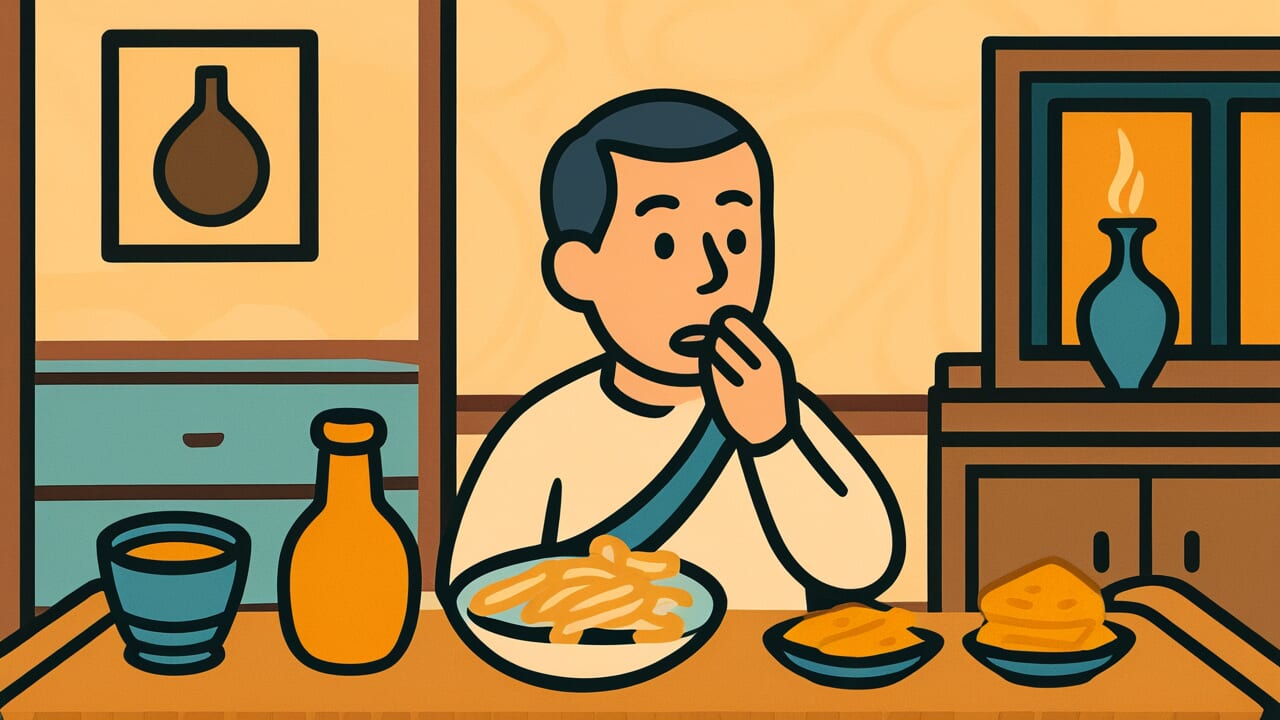How to Read “Eat at the eastern house and rest at the western house”
Tōka ni shokushite seika ni ikoan
Meaning of “Eat at the eastern house and rest at the western house”
This proverb criticizes someone who betrays a benefactor and sides with their enemy instead.
When you receive the important favor of a meal at the eastern house, then go rest at the western house, this becomes a clear betrayal if the two houses are in conflict.
People use this saying when someone turns their back on a benefactor to join the opposing side. It’s especially effective when pointing out ungrateful behavior where someone forgets their debt and switches to the enemy for personal gain.
Even today, this proverb perfectly describes situations like leaking information to a competitor while your company trains you, or betraying supporters to join the opposition.
The expression teaches the importance of loyalty and sincerity in human relationships through the familiar example of neighboring houses.
Origin and Etymology
The exact origin of this proverb isn’t clearly documented in historical texts. However, the structure of the phrase reveals an interesting background.
The terms “eastern house” and “western house” refer to neighboring homes. In old Japan, relationships with neighbors were even closer than today.
People lived helping each other as a matter of course. They shared meals and supported each other in times of trouble within these tight-knit communities.
“Eat” means receiving meals, while “rest” means taking shelter, essentially establishing your life base there.
Eating at the eastern house while sleeping at the western house might seem like maintaining good relations with both families at first glance.
However, this proverb carries a critical meaning because it contains an element of betrayal. You’re not being sincere to the eastern house that fed you, while aligning yourself with the western house that opposes them.
This two-faced behavior became a symbol of insincerity in human relationships.
Because neighborhood relations formed the foundation of life in that era, such acts of betrayal carried especially heavy meaning.
Usage Examples
- That person truly embodies “Eat at the eastern house and rest at the western house” by joining the side that criticizes the mentor who raised them
- I could never do something like “Eat at the eastern house and rest at the western house” by leaking information to competitors while earning a client’s trust
Universal Wisdom
The proverb “Eat at the eastern house and rest at the western house” sharply addresses the universal problem of human duplicity and loyalty that wavers with profit.
Why can people betray those who have helped them? It’s because there are moments when immediate benefits or safety appear larger than past favors.
When the western house looks stronger and more attractive, people forget the warmth of meals at the eastern house. This movement of the heart may be a weakness inherent in human nature across all times and places.
Yet the fact that this proverb has been passed down for so long also proves that people have never tolerated such betrayal.
Criticism of those who forget favors, contempt for those who lose sincerity. This wasn’t just moral condemnation but wisdom for maintaining community.
People cannot live without trust. That’s why our ancestors continued to warn through this proverb how betrayal damages human dignity.
They believed that gratitude and sincerity are the essence of what makes us human.
When AI Hears This
Analyzing this proverb mathematically reveals a surprising structure. If everyone adopts the strategy of “eat at the eastern house and rest at the western house,” providers become zero and the system’s total benefit goes negative.
This is a classic asymmetric prisoner’s dilemma.
Let’s quantify this concretely. In a village with 10 houses, each bears a cost of 10 for providing meals and 5 for providing shelter.
If everyone cooperates, the total cost is 150 and everyone benefits. But if just one house takes the free-rider strategy, that house gains benefit of 15 at cost 0.
Here’s the critical point: once this “winning side” is observed, other houses begin to imitate. When 5 houses adopt the same strategy, providers drop to 5 and free-riders start competing for resources.
When 8 houses take this strategy, the remaining 2 houses face 4 times the burden and they also stop providing. Eventually everyone reaches an equilibrium point of cost 0 and benefit 0.
What’s even more interesting is that this proverb includes a time axis. Eastern house in the morning, western house in the evening—exploiting at different times.
This means continuous exploitation without giving resources time to recover, the same structure as “overharvesting” in ecology.
A single exploitation allows recovery, but continuous exploitation depletes the resource base itself. It’s remarkable that modern environmental problems were already depicted in a proverb from centuries ago.
Lessons for Today
This proverb teaches us that the value of trust is hard to see but irreplaceable.
In modern society, job changes and career shifts have become normal, and human relationships have become more fluid.
But precisely because of this, the value of “sincerity” as an asset has increased. In an age when information spreads instantly on social media, regaining lost trust is far more difficult than before.
What matters is not forgetting the favors you’ve received. And even if you choose a different path, communicating it sincerely rather than as betrayal.
If you leave the eastern house, express gratitude before departing with dignity. If you go to the western house, build new relationships without disparaging the eastern house.
Please don’t forget the small kindnesses you received today, the people who supported you.
Even when profits and positions change, maintaining sincerity as a person—that’s the secret to living a rich and fulfilling life.


Comments